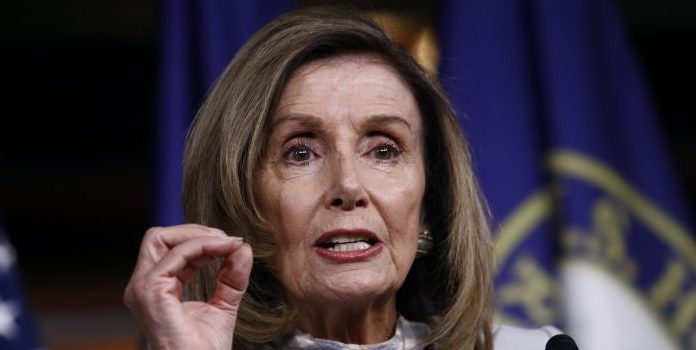(Associated Press) Democrats drove Wednesday toward extending their control of the House for two more years but with a potentially shrunken majority as they lost at least six incumbents and failed to oust any Republican lawmakers in initial returns.
By 4 a.m. EST, Democrats’ only gains were two North Carolina seats vacated by GOP incumbents after a court-ordered remapping made the districts more Democratic. Though they seemed likely to retain House control, their performance was an unexpected disappointment for the party, which hoped for modest gains of perhaps 15 seats.
After decades of trying, Republicans defeated 15-term Rep. Collin Peterson from a rural Minnesota district that backed President Donald Trump in 2016 by 31 percentage points, Trump’s biggest margin in any Democratic-held district. Peterson, who chairs the House Agriculture Committee, opposed Trump’s impeachment and is one of the House’s most conservative Democrats. He was defeated by Republican Michelle Fischbach, the former lieutenant governor.
Also losing were freshmen Democrats Debbie Mucarsel-Powell and Donna Shalala, health secretary under President Bill Clinton, in adjacent South Florida districts where Trump seemed to consolidate support among Cuban voters. Others defeated were Democratic freshmen Joe Cunningham of South Carolina, Xochitl Torres Small of New Mexico and Kendra Horn in Oklahoma, who had surprising victories in 2018 in districts Trump carried decisively in 2016.
The fight for Torres Small’s seat cost around $35 million, making it one of the country’s most expensive races, according to the nonpartisan Center for Responsive Politics. She was defeated by Yvette Herrell, a former state legislator.
Democrats were also disappointed in the Senate, where they nursed fading hopes of winning the majority. Trump’s challenge from Democrat Joe Biden remained too close to call.
Before votes were counted, both parties’ operatives said the GOP would be fortunate to limit Democratic gains to a modest single digits. Democrats control the House 232-197, with five open seats and one independent. It takes 218 seats to control the chamber.
A smaller Democratic majority would make it tougher for House Speaker Nancy Pelosi, D-Calif., to unite her lawmakers as a handful of progressive freshmen arrive for the new Congress.
By retaining House control, Democrats would mark only the second time in a quarter century that they’ve led the chamber for two consecutive two-year Congresses. The first period ran from 2007 through 2010, when Pelosi was serving her first four years in her post.
“Our purpose in this race was to win so that we could protect the Affordable Care Act and so that we could crush the virus,” Pelosi told reporters, citing former President Barack Obama’s health care act.
She declared that Democrats had won the House majority, which seemed highly likely but hadn’t been officially declared by The Associated Press.
Democrats’ hopes of protecting their majority and even expanding it were based on public anxiety over the pandemic, Trump’s alienation of suburban voters and a vast fundraising edge. But those advantages didn’t carry them as far as they’d hoped.
With GOP expectations for capturing the House all but nonexistent entering Election Day, Republicans were happy with the results.
“House Republicans have outperformed all expectations,” said Dan Conston, who heads the Congressional Leadership Fund, a committee aligned with House GOP leaders that provides millions to Republican candidates.
Democrats lost a majority Hispanic district in West Texas they expected to win when the GOP incumbent retired. And they lost a series of what seemed coin-flip races, failing to defeat GOP incumbents in Cincinnati, rural Illinois, central Virginia and the suburbs of St. Louis and Texas.
In a district between Austin and San Antonio, freshman GOP Rep. Chip Roy withstood a challenge from Democrat Wendy Davis. Davis gained fame as a state legislator by waging a 2013 filibuster against an anti-abortion bill, then lost a race for governor the following year. The conservative Club for Growth made her its biggest target, spending over $6 million against her this year.
As if symbolically, Illinois Rep. Cheri Bustos, who leads the Democratic Congressional Campaign Committee, was in her own tight race in a closely divided district she won by 24 percentage points in 2018.
Some endangered Democratic freshmen like Texas’s Lizzie Fletcher, Georgia’s Lucy McBath and New Jersey’s Tom Malinowski and Andy Kim held on.
But the party notched no victories in long-shot races they’d hoped would bolster their majority. Republicans retained such districts in central North Carolina; Montana; Omaha, Nebraska; and around Little Rock, Arkansas.
As Wednesday morning progressed, other hotly fought races remained undecided in Indiana and Virginia.
Scores of both parties’ incumbents from safe districts were easily reelected. These included progressive star Democratic Rep. Alexandria Ocasio-Cortez in New York City and both parties’ No. 3 House leaders, Democrat James Clyburn of South Carolina and Republican Liz Cheney of Wyoming.
Buoying Democrats was a coast-to-coast edge in campaign fundraising, including for all 29 Democrats from districts Trump won in 2016 and Republicans were targeting. By early Wednesday, Peterson, Cunningham and Torres Small were the only ones of those Democrats who’d lost.
Nearly all Democratic incumbents in potentially vulnerable districts were outspending their GOP challengers, often by vast margins, according to an AP analysis of Federal Election Commission campaign reports.
As in 2018 when they grabbed House control, Democratic ads emphasized pledges to make health care more accessible, preserve coverage for pre-existing conditions and shield voters from Republicans out to terminate those requirements. Many Republicans say they want to dismantle Obama’s health care law while retaining its coverage for pre-existing conditions, but they’ve not presented a detailed proposal for doing that.
The pandemic has only amplified Democrats’ focus on health care. Trump’s repeated false statements downplaying the virus’s severity have also given Democrats political fodder.

